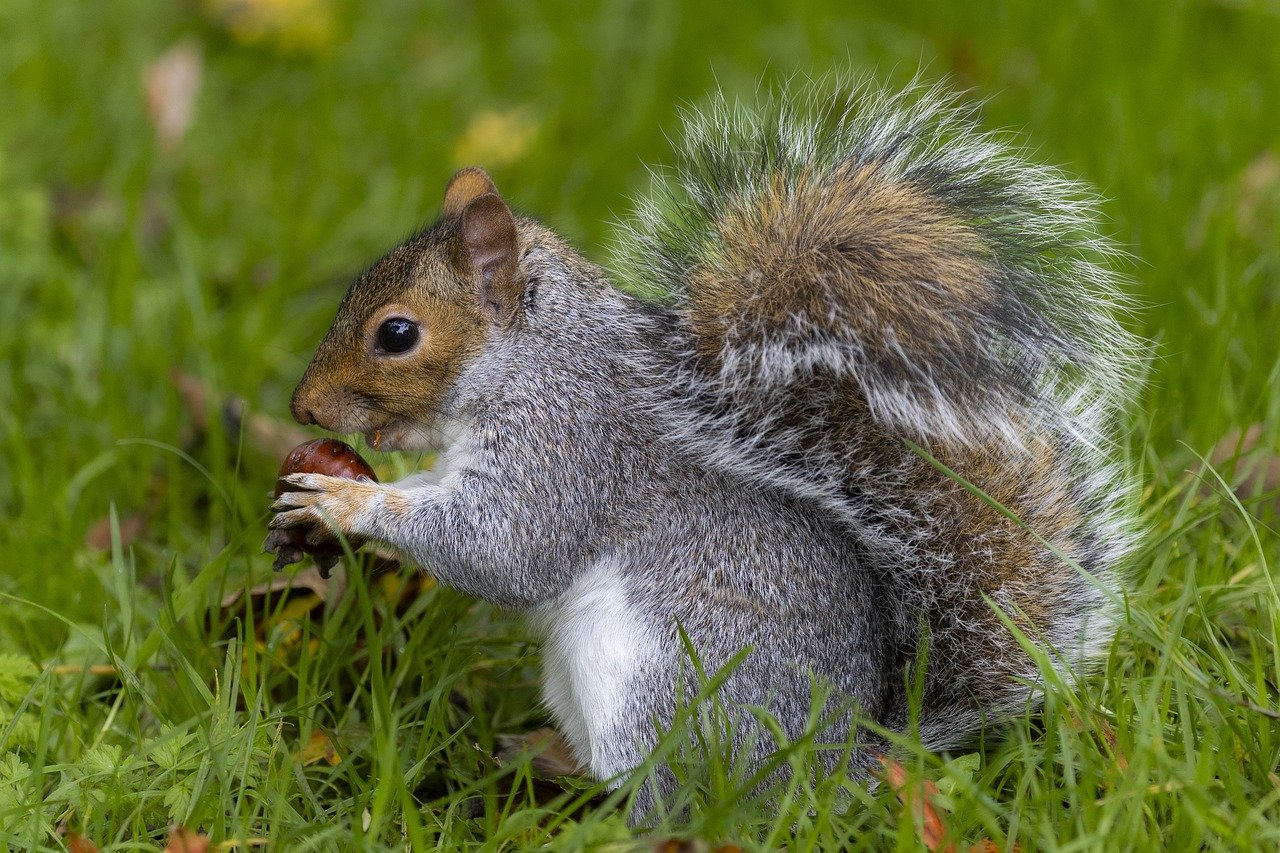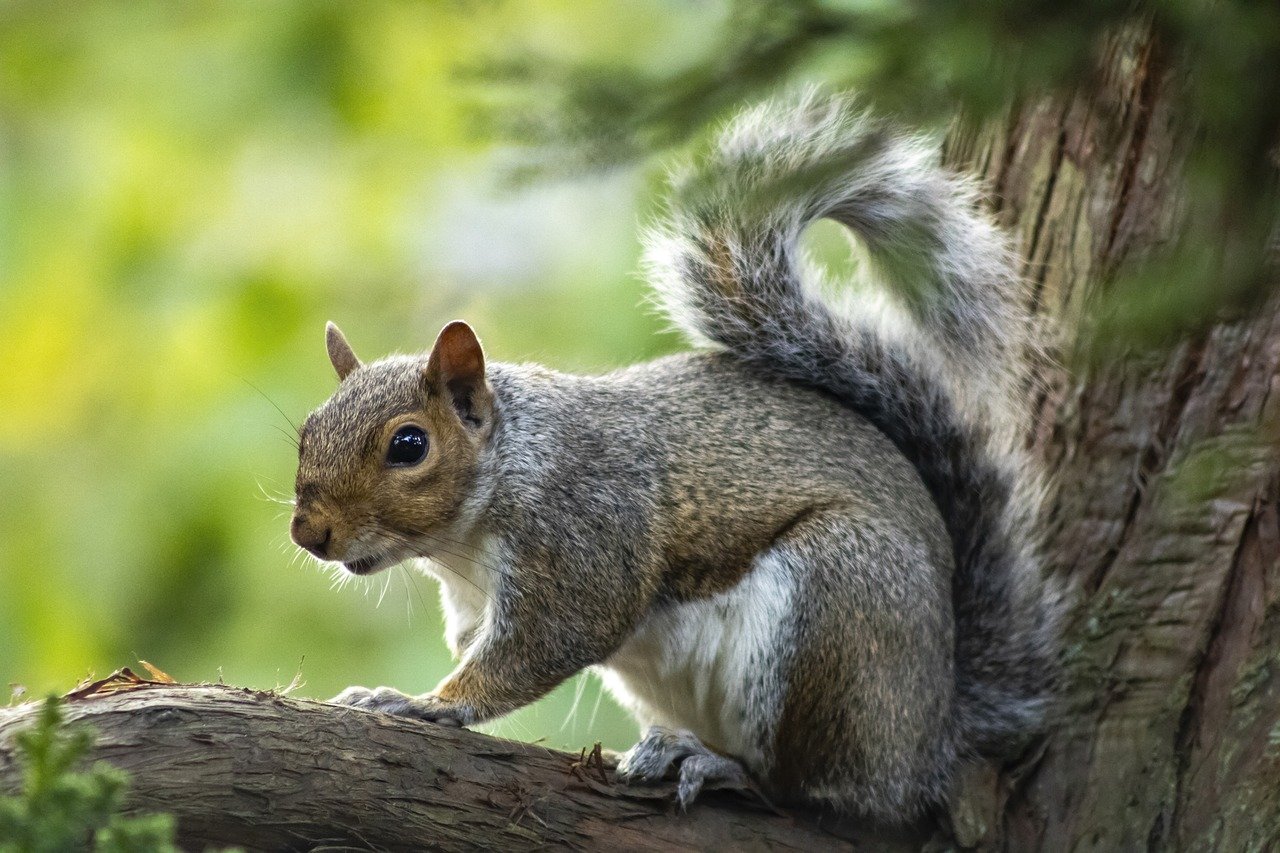
Those bushy-tailed bandits are back! Squirrels, while undeniably cute in their acrobatic pursuits, can wreak havoc on your carefully cultivated garden. Unearthing bulbs, pilfering prized vegetables, and leaving behind a trail of chewed-up chaos – their relentless pursuit of a tasty treat can leave you feeling defeated. There are ways to reclaim your green haven without resorting to harsh tactics. Here’s your ultimate guide to keeping squirrels out of your garden, using humane and effective solutions.
This post may have affiliate links. This means that sometimes when you click a link on our site and make a purchase on Amazon, we may earn a small commission at no additional cost to you. We only recommend products we truly believe in, and your support helps keep us running!
Understanding The Enemy (Sort Of)

Let’s get to know our furry foes a little better. Squirrels are intelligent creatures with a remarkable memory. They excel at problem-solving and can quickly adapt to new situations. This means simply chasing them away once won’t deter them for long. The key lies in understanding their motivations and making your garden a less attractive proposition.
What Makes Your Garden A Squirrel Buffet?
- A Feast for the Senses: Squirrels are driven by a constant need to find food. They have an excellent sense of smell and can detect buried nuts and seeds from afar. Easy access to fruits, vegetables, and bird feeders only sweetens the deal.
- Acorn Apartments: Dense foliage and hollowed-out branches provide ideal nesting spots for squirrels. They feel safe and secure amongst the greenery, making your garden prime real estate.
- Highway to Heaven: Flimsy fences and low-hanging branches are like open invitations for squirrels. They use these to easily bypass obstacles and access your prized plants.
Outsmarting the Squirrelly Saboteurs: A Multi-Pronged Approach
Now that we know what attracts squirrels, it’s time to implement a multi-pronged approach to make them think twice about visiting your garden.
Disrupting The All-You-Can-Eat Buffet
- Become a Nut Hoarder (The Good Kind): Deny squirrels their buried treasure by diligently collecting fallen nuts and acorns from your property. This eliminates a readily available food source and forces them to search elsewhere.
- Spice Up Your Defenses: Capsaicin, the compound that makes chili peppers hot, is a natural deterrent for squirrels. Mix cayenne pepper flakes or hot sauce with water (dilute to avoid harming plants) and spray it directly on vulnerable plants. Be mindful: Birds can’t taste capsaicin, so feel free to add a sprinkle to your bird feeder to keep squirrels at bay without affecting your feathered friends.
- Fortress Fruit: Cover vulnerable fruits and vegetables with netting or mesh cages. This creates a physical barrier that squirrels are unwilling (or unable) to breach.
- The Bird Feeder Blockade: Invest in squirrel-proof bird feeders. These feeders have special features like weight restrictions or closing mechanisms that prevent squirrels from accessing the birdseed.
Making Your Garden Less Appealing as a Squirrel Sanctuary
- Trim Those Branches: Cut back low-hanging branches that squirrels might use as access points into your garden. This creates a clear barrier and discourages them from attempting a high-wire act.
- Let There Be Light: Squirrels prefer the cover of dense foliage for nesting. Thin out overgrown areas and allow more sunlight to penetrate. This makes your garden less inviting as a potential residence.
- The Power of Predator Scents: While you might not want the real deal roaming your garden, predator scents that mimic predators like fox urine or owl pellets can be effective deterrents. Caution: Always follow the instructions on the product label and ensure it’s safe for use around plants and pets.
Enlist Some Help (The Friendly Kind)
- The Canine Cavalry: Dogs can be a natural deterrent for squirrels. Their presence and scent can make squirrels feel unwelcome. However, be sure to supervise your dog outdoors and ensure they can’t harm any wildlife.
- The Guardian of the Garden: A strategically placed scarecrow or owl decoy can startle squirrels and keep them on their toes. But be aware: Squirrels are intelligent creatures and may eventually habituate to these deterrents. Rotate your decoy placements and combine them with other strategies for maximum effectiveness.
Embrace Peaceful Coexistence
While keeping squirrels completely out of your garden might be a never-ending battle, there are ways to promote peaceful coexistence.
- Offer a Designated Dig Zone: Create a dedicated area in your garden where you bury nuts and seeds specifically for squirrels. This provides them with an alternative food source and reduces the temptation to raid your prized plants. Location is key: Place the designated dig zone away from your prized plantings to minimize collateral damage.
Plant Power: The Beauty of Repellents
There’s a whole world of plants that squirrels find unpalatable, making them excellent natural deterrents. Here are some squirrel-repellent powerhouses to consider incorporating into your garden design:
- Daffodils and Alliums: These spring beauties boast a pungent odor that squirrels find offensive. They’ll add a pop of color and deter unwanted guests simultaneously.
- Fritillaria: These elegant trumpet-shaped flowers not only look stunning but also possess a strong musky scent that repels squirrels.
- Castor Bean: While the seeds of the castor bean plant are highly toxic to humans and animals, the foliage itself is a deterrent for squirrels due to its unpleasant taste. Important Note: Castor bean plants are highly toxic, so exercise extreme caution if planting these. Keep them out of reach of children and pets and always wear gloves when handling them.
- Coleus: These colorful foliage plants come in a variety of vibrant hues and have a strong scent that discourages squirrels.
- Marigolds: Not only are marigolds known for their cheerful orange blooms, but they also possess a natural insecticidal property that repels a variety of pests, including squirrels.
Remember: When using any plant-based repellent, it’s important to plant them in sufficient quantities for them to be effective.
Long-Term Strategies: Fortifying Your Garden
- Fence Like a Pro: While squirrels can be determined climbers, a sturdy fence can be a significant deterrent. Opt for a fence that’s at least six feet tall and has a metal mesh bottom that extends a foot or two underground. This discourages digging attempts.
- Bury Those Treasures: When planting new trees and shrubs, especially those with bulbs or nuts, consider using a wire mesh basket around the root ball. This creates a physical barrier that prevents squirrels from digging up your prized plants.
- The Power of Water: Motion-activated sprinklers can be a surprisingly effective deterrent. The sudden burst of water startles squirrels and discourages them from lingering.
Conclusion: Protecting Your Garden Paradise
By implementing these humane and effective solutions, you can create a garden that’s less inviting to squirrels while remaining a haven for your favorite plants and flowers. Remember, consistency is key. Using a combination of these strategies and adapting them to your specific garden layout will lead to long-term success. Soon, you can spend less time worrying about pesky squirrels and more time enjoying the fruits (and vegetables!) of your labor.
